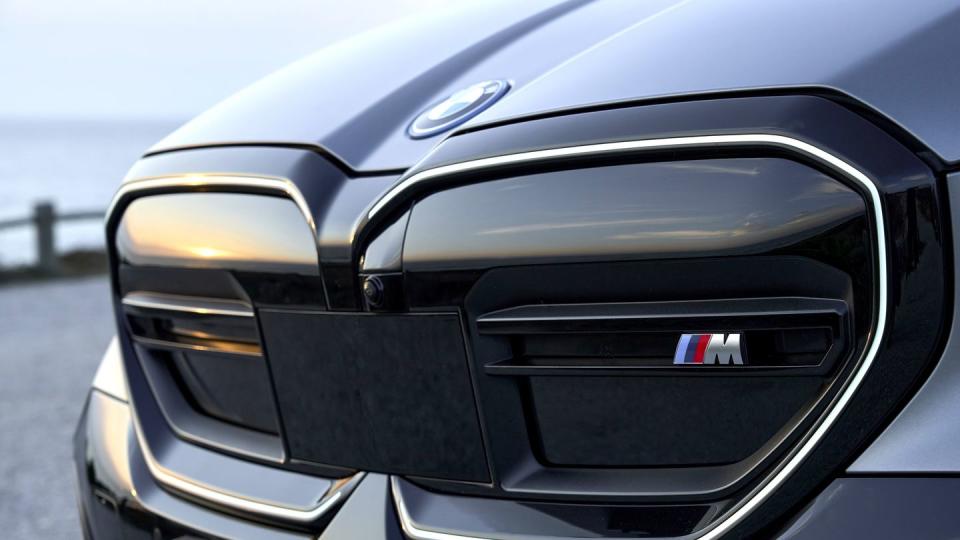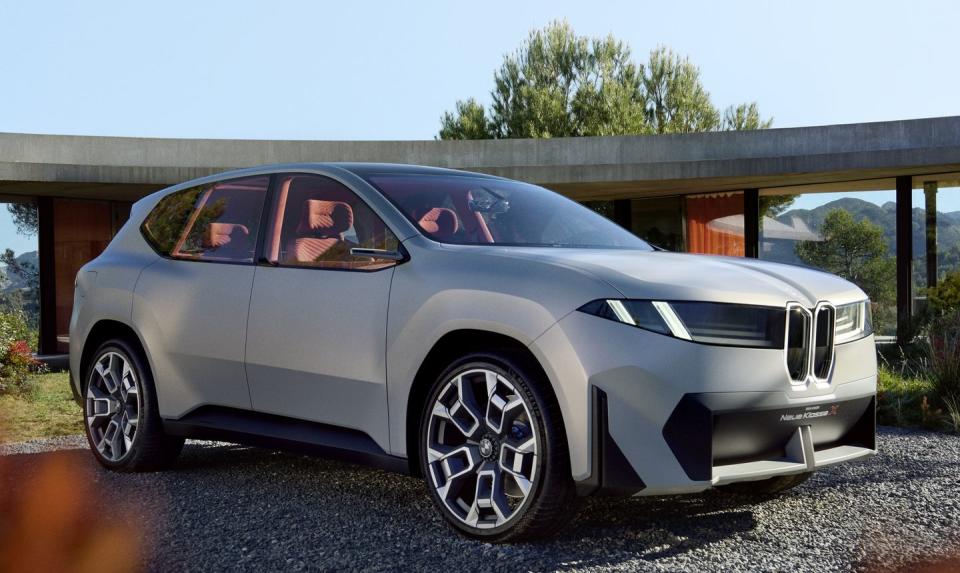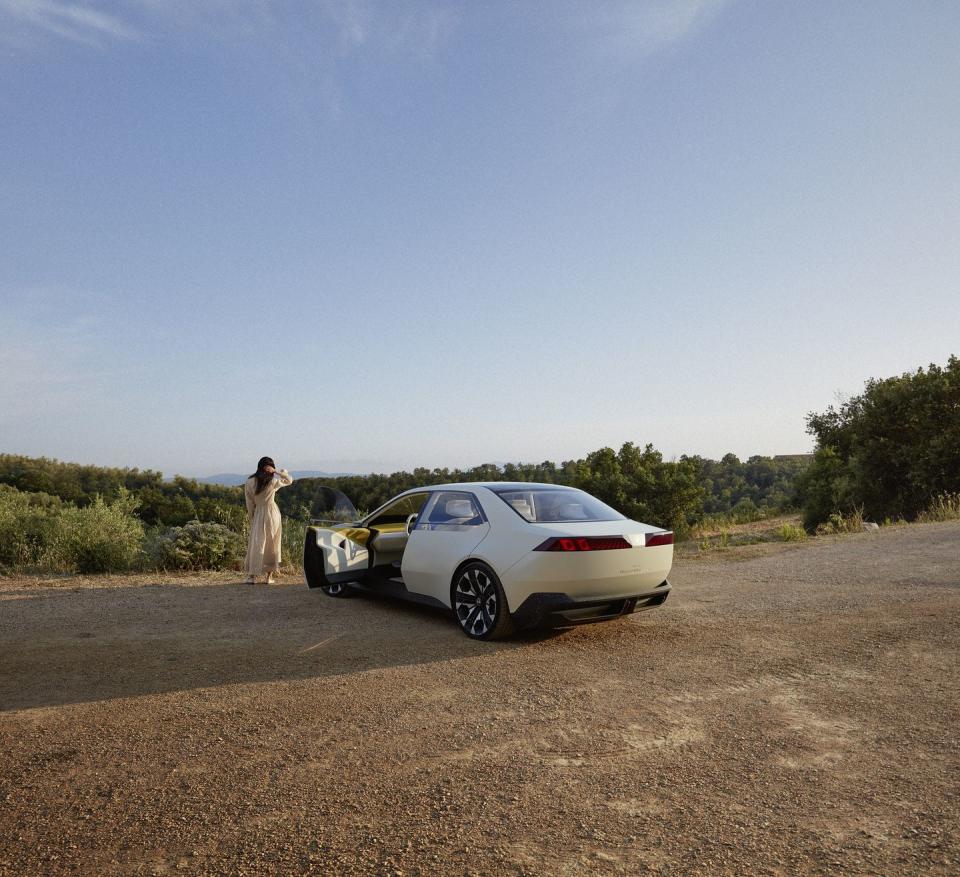BMW M's Division Plans to Beat Isaac Newton With Its First EV

Electrification targets have been shifting as of late in the automotive world, with plans originally made for 2030 now being pushed to 2035 and beyond in many jurisdictions and board rooms — which means there's a growing question of what the future of performance will look like. Will EV sports cars like Hyundai's Ioniq 5 N become the norm in the coming decade? Will the hybridized sports machines like the new Porsche 911 rule the roost? Or will we just stick with good ol' internal combustion for another generation, in spite of everything?
The boss of BMW's M program has absolutely no doubt: battery-electric is the future. "The pure electric high-performance vehicle, when it comes out, the one we're currently working on, will beat everything you've ever seen," Franciscus Van Meel, the director of BMW's M division, said. "It will make it very difficult to say, 'I don't want to have this.'"
While he's undoubtedly biased, that kind of unwavering confidence in the company's upcoming EVs is compelling. Compelling, and perhaps a bit unexpected, given BMW's stop/start history of electric love. The company was an early adopter in the grand scheme of things, releasing the electric i3 in 2013 and the plug-in i8 a year later. These radical cars were meant to point a new, electrified way forward for the brand, but neither was successful enough to warrant a true successor.
Now, Van Meel says his engineers feel like they are "Alice in Wonderland" thanks to the extra control electrification provides, enabling them to do things they never could before. "In simulations, you could show that it's possible, but actually, you could not do that in hardware because it was too slow or too complicated," he said. "But we always tried to get as close as possible, and now, it is possible to come very close."
Enabling that is the development of new platforms like BMW's Neue Klasse, which will form the foundation of its next-generation sedans, and the Neue Klasse X, which will do the same for its SUVs. These platforms house what BMW calls its "Heart of Joy," an overly evocative term for the completely re-engineered control systems within the car.

Today's cars often rely on a variety of disparate onboard computing solutions sourced from various vendors, all communicating a controller area network, a.k.a. a "CAN bus." (Imagine a Bosch ABS system handling braking duties, acting independently of a traction control system developed by BMW, the two talking to each other over a laggy network.) BMW's future EVs will instead utilize fewer, more powerful centers of computation, all developed in-house.
This central processor will have more work to do, but aggregating those disparate systems together means they can interact more capably and quickly. Compared to the dozens of task-focused systems from suppliers like Bosch and Mahle, scattered throughout the car and connected by a maze of overlapping network cables, BMW's Heart of Joy brings everything together, enabling all of the car's control systems to speak to — and work with — each other more efficiently.
"It's a different game," Van Meel said. With this system, the car can not only react 10 times faster than before when detecting things like wheelspin or brake lock-up, but the formerly disparate systems that handled those situations now work together as a single, in-house unit.
When it comes to an EV, that will allow for more comprehensive brake regeneration, blending in the physical brakes only when needed in a more advanced way than we see in today's EVs. Stability control, traction control, and overall performance, Van Meel says, will also be significantly enhanced.
Dirk Häcker, head of development at BMW M Automobiles, said his team has been involved in the development of Neue Klasse for more than three years. "Extremely involved," he said, which should make for an encouraging amount of performance in the base platform.

However, the M division is working on its own special EV components, including motors, which Van Meel says "will be the benchmark" of electric performance. M's performance EV will use four of them, raising the torque-vectoring bar to new heights.
"If you use four motors, you can also use, for example, high-performance recuperation. You can regulate ABS much faster than today, only by the electric motor," Häcker said.
M is working on its own batteries, too, which will be largely designed and developed in-house. "Of course, certain components we buy from suppliers, but we're not buying batteries," Van Meel said.
While Van Meel and Häcker were clearly bullish on the future of EV performance, they're not putting all the company's eggs in a single electric basket. "You cannot say it's going to happen exactly this way because the world is too diverse, and it's changing all the time," Van Meel said. He's sure that some markets will buy new internal combustion cars for decades, and the brand must support that. "You have to be able to react, to respond to these different situations by offering the right products."
To that end, BMW continues to develop new engine technologies, like the S68 V-8 hybrid system found in the company's current sports SUV, the XM, which Van Meel says will be updated to meet future European and American emissions regulations.
The company has investigated e-fuels but, unlike Porsche, hasn't made any particular commitment to them. "We are not developing e-fuels, but we take a very intensive look at development all over the world," Häcker said. "And we are also able to use most of them."
But the twinkle in both of their eyes when discussing electrification clearly shows that this is the path they're most excited about. And it's not just performance.
"Our philosophy is to be neutral, linear, predictable," Häcker said. "That will open a new door for the future."
But they're trying to avoid gimmicks, like fake engine noises of the sort found in the Hyundai Ioniq 5 N — a sports EV developed with plenty of feedback from former M boss Albert Biermann. Van Meel, the current M CEO calls this "the wrong approach." He admits you need some form of feedback to help gauge your speed, particularly on the track: "If you look at your speedometer, two cars pass you by." Van Meel says that M is working on a new solution to this problem, something equally suited for racing and the road, but wouldn't provide any hints on exactly what it might be.

That's just one challenge the minds at M are tackling. "This is fascinating for the engineers, to see what is the ultimate, perhaps the maximum performance possible in the physics of Newton," Häcker said.
"We're going to beat Newton again," Van Meel said.
You Might Also Like

 Yahoo Autos
Yahoo Autos 